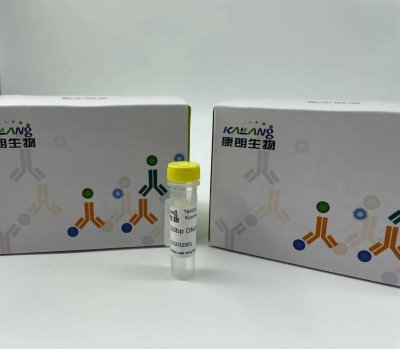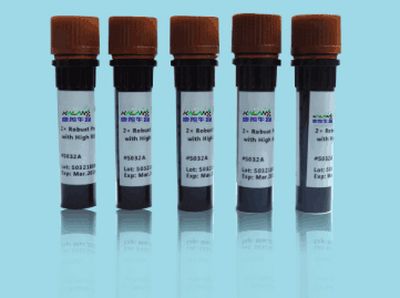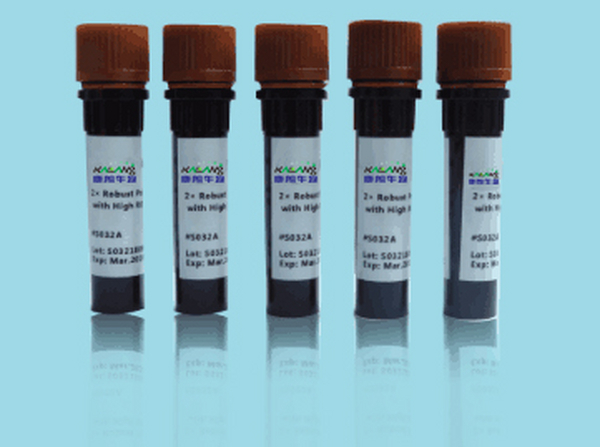QQ:3002763590


客服电话:021-61998208
TSP50 rabbit Polyclonal Antibody
TSP50抗体
TSP50抗体应用:WB 1:500-2000 ELISA 1:5000-20000caution:Although related to peptidase S1 family, lacks the conserved active Ser residue in position 310 which is replaced by a Thr, suggesting that it has no protease activity.,miscellaneous:DNA hypomethylation is accompanied by the expression of the gene in the testis.,similarity:Belongs to the peptidase S1 family.,similarity:Contains 1 peptidase S1 domain.,tissue specificity:Testis specific. Differentially expressed in some breast cancer tissues.,
TSSC4 rabbit Polyclonal Antibody
TSSC4抗体
TSSC4抗体应用:WB 1:500-2000 ELISA 1:5000-20000tumor suppressing subtransferable candidate 4(TSSC4) Homo sapiens This gene is one of several tumor-suppressing subtransferable fragments located in the imprinted gene domain of 11p15.5, an important tumor-suppressor gene region. Alterations in this region have been associated with the Beckwith-Wiedemann syndrome, Wilms tumor, rhabdomyosarcoma, adrenocortical carcinoma, and lung, ovarian, and breast cancer. This gene is located among several imprinted genes; however, this gene, as well as the pan-hematopoietic expression gene (PHEMX), escapes imprinting. This gene may play a role in malignancies and disease that involve this region. Several transcript variants encoding two different isoforms have been found for this gene. [provided by RefSeq, Jul 2014],
TSSK3 rabbit Polyclonal Antibody
TSSK3抗体
TSSK3抗体应用:WB 1:500-2000 ELISA 1:5000-20000testis specific serine kinase 3(TSSK3) Homo sapiens This gene encodes a kinase expressed exclusively in the testis that is thought to play a role in either germ cell differentiation or mature sperm function. [provided by RefSeq, Jul 2008],
TSSP rabbit Polyclonal Antibody
TSSP抗体
TSSP抗体应用:WB 1:500-2000 This gene encodes a serine protease expressed exclusively in the thymus. It is thought to play a role in the alternative antigen presenting pathway used by cortical thymic epithelial cells during the positive selection of T cells. The gene is found in the large histone gene cluster on chromosome 6, near the major histocompatibility complex (MHC) class I region. A second transcript variant has been described, but its full length nature has not been determined. [provided by RefSeq, Jul 2008],
TSYL2 rabbit Polyclonal Antibody
TSYL2抗体
TSYL2抗体应用:WB 1:500-2000 ELISA 1:5000-20000TSPY like 2(TSPYL2) Homo sapiens This gene encodes a member of the testis-specific protein Y-encoded, TSPY-like/SET/nucleosome assembly protein-1 superfamily. The encoded protein is localized to the nucleolus where it functions in chromatin remodeling and as an inhibitor of cell-cycle progression. This protein may play a role in the suppression of tumor growth. [provided by RefSeq, Sep 2009],
TTBK1 rabbit Polyclonal Antibody
TTBK1抗体
TTBK1抗体应用:WB 1:500-2000 Summary:This gene belongs to the casein kinase 1 superfamily. The encoded protein is a neuron-specific, serine/threonine and tyrosine kinase, which regulates phosphorylation of tau, a protein that associates with microtubule assemblies and stabilizes them. Genetic variants in this gene are associated with Alzheimer's disease. [provided by RefSeq, Jul 2016],
TTC19 rabbit Polyclonal Antibody
TTC19抗体
TTC19抗体应用:WB 1:500-2000 ELISA 1:5000-20000tetratricopeptide repeat domain 19(TTC19) Homo sapiens This gene encodes a protein with a tetratricopeptide repeat (TPR) domain containing several TPRs of about 34 aa each. These repeats are found in a variety of organisms including bacteria, fungi and plants, and are involved in a variety of functions including protein-protein interactions. This protein is embedded in the inner mitochondrial membrane and is involved in the formation of the mitochondrial respiratory chain III. It has also been suggested that this protein plays a role in cytokinesis. Mutations in this gene cause mitochondrial complex III deficiency. Alternatively spliced transcript variants have been found for this gene. [provided by RefSeq, Sep 2012],
最新动态
-

Anti-GNGT1 KL20092-001(50ul)
2021-10-11 -

Anti-GNGT1 antibody(50ul) KL20093-001
2021-10-11 -

MUC5AC (PT2058) mouse Monoclonal Antibody
2021-01-06 -

mOrange mouse Monoclonal Antibody(Mix)
2021-01-05
热门标签
- Histone H3 rabbit Polyclonal Antibody Histone H3抗体
- EGFR rabbit Polyclonal Antibody EGFR抗体
- Cy3 Conjugated
- AbFluor™ 555 Conjugated
- AbFluor™ 680 Conjugated
- AbFluor™ 350 Conjugated
- AbFluor™ 647 Conjugated
- AbFluor™ 594 Conjugated
- AbFluor™ 405 Conjugated
- Cy5 Conjugated
- AbFluor™ 488 Conjugated
- Cyclophilin B抗体 Cyclophilin B Monoclonal Antibody(2B10)
- COX IV抗体 COX IV Monoclonal Antibody(6C8)
- PCNA抗体 PCNA Monoclonal Antibody(12D10)
- FAK rabbit Polyclonal Antibody FAK抗体
邮箱:3002763590@qq.com
电话:021-61998208

扫码关注微信公众号






